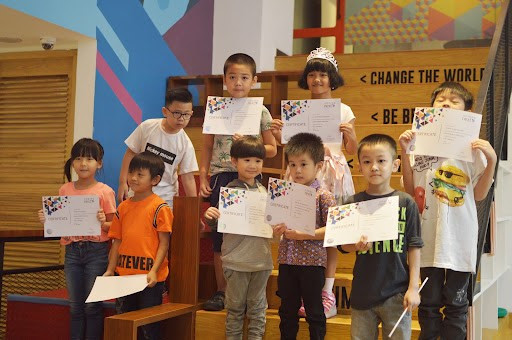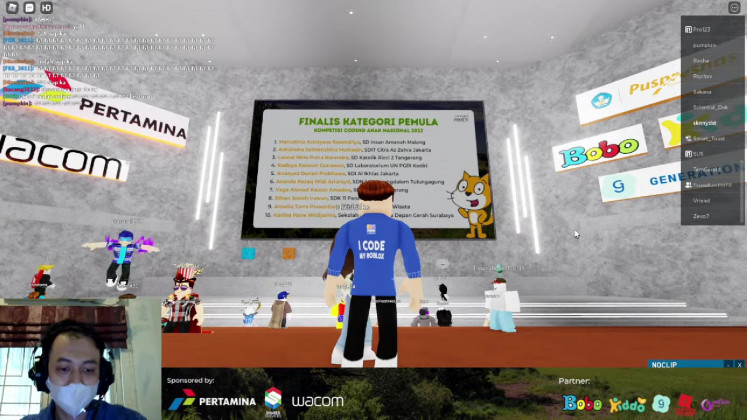Popular Reads
Top Results
Can't find what you're looking for?
View all search resultsPopular Reads
Top Results
Can't find what you're looking for?
View all search resultsFirst Indonesia-wide coding competition for kids organized by Koding Next
Indonesia is one of the world’s fastest-growing countries in terms of digitalization
Change text size
Gift Premium Articles
to Anyone
I
ndonesia is one of the world’s fastest-growing countries in terms of digitalization. However, the country still lacks programmers and digital talents needed to solve economic and digital-development issues. The World Bank predicted that Indonesia will experience a shortage of 9 million digital talents by 2030.
ICT and programming-related studies are still not widely accessible to the younger generation of Indonesians while the need for programmers and IT-related positions is increasing every year. Many younger people do not choose coding and programming as their profession due to its perceived difficulty. The problem was recognized by Koding Next, a technology school for kids. To promote coding to a wider audience, the educational institution organized a National Coding Competition.
The NCC (National Coding Competition), organized by Koding Next, is open and fully free to participate for everyone aged 8-15 regardless of where and when they learned coding. Most importantly, the company provides free coding lessons for all the registered participants prior to the beginning of the competition. Since no coding experience is required to participate in the competition, everyone can dare to try to code and win!
The winners of the competition will be announced in Koding Next Metaverse. (Courtesy of Koding Next/.)“Every year we notice increasing interest in coding education, but we recognise that access to these kinds of courses is limited and available mainly to the part of society which can afford courses like ours. We want to raise awareness of the necessity and importance of technological education to a wider audience. Therefore, we decided to create a competition with a big prize and access to free coding courses for any child who would like to join. We will send the winner to an educational camp in the USA, and a few finalists will get laptops and other cutting-edge equipment.” says Mateusz Rybinski, COO and co-founder of Koding Next.
This year, the National Coding Competition has an ecology theme. This is a very important subject for founders of the school, and they would like to show how technology can improve various aspects of life.
The Education, Culture, Research and Technology Ministry and several public and private schools in Indonesia confirmed that they are willing to support the promotion of this contest.
The competition has 2 categories: beginners and more advanced young programmes. Beginners in the first phase should address the challenge, “Sorting Out Trash”. They are expected to create an arcade game in which a player sorts and allocates waste to the right category with a coding game using MIT Scratch.
The challenge that the advanced group will address is “Polluted City”. In this category, contestants create an Obby Game where the player deals with the issue of pollution. The coding game uses the Roblox Studio application. For the last 2 months, kids and teenagers aged 8-15 have been registering for the competition and receiving free coding lessons from Koding Next as a part of the preparation. All participants joined the Discord group where they could communicate with each other and get to know other like-minded young innovators.
10 Best Scratch Coding projects in Code the Earth (Source:YouTube)
The top-10 participants in each category will be invited to the Big Final in Koding Next HQ, located in Kemayoran, North Jakarta. The final will take place on May 28 and will be organized in a Hackathon setting, where students will code in a live setup and prepare their projects. At the end, the projects will be pitched to the jury, composed of tech professionals and representatives of the ministries. The event will be livestreamed.
10 Best Scratch Coding projects in Code the Earth (Source:YouTube)
Koding Next was established in 2016 and over the years has become the biggest technology school for kids in Indonesia. Its program offers courses for kids from 4 to 17 years old. They cooperate with a big number of national and international schools across Indonesia. They continue their expansion inside the country as well as internationally. This year they opened their first locations abroad in Malaysia and Europe. Thanks to cooperation with textbook publisher Marshall Cavendish, their curriculum is available for schools in 18 countries in Europe, Africa and Asia.











